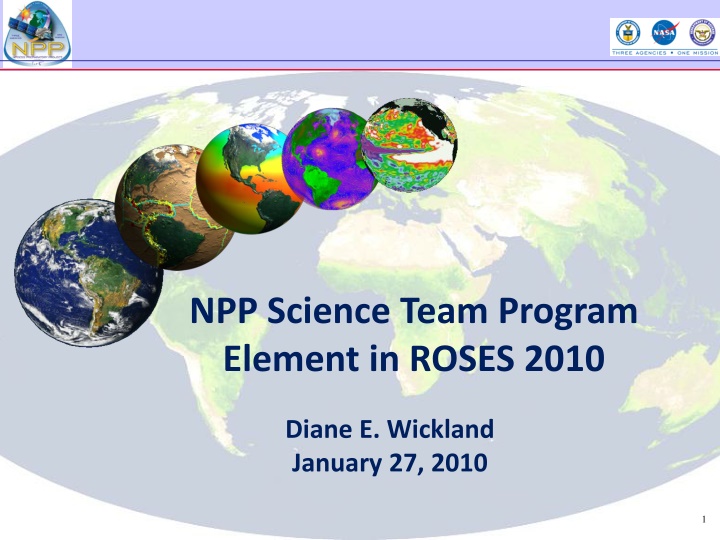
NPP Science Team Program Element in ROSES 2010 Overview
Gain insights into the NPP Science Team Program Element in ROSES 2010, focusing on the continuity of data sets, NASA's re-competition plans, and the importance of long-term measurements for climate science and environmental studies. Explore the significance of Earth system data records and climate data records for comprehensive understanding and monitoring of natural and human-induced changes to the Earth system. Stay informed about NASA's efforts to ensure the accuracy, stability, and quality of satellite sensor data products over time. Discover upcoming opportunities for research involvement in securing high-quality data for Earth system science and global change studies.
Download Presentation

Please find below an Image/Link to download the presentation.
The content on the website is provided AS IS for your information and personal use only. It may not be sold, licensed, or shared on other websites without obtaining consent from the author. If you encounter any issues during the download, it is possible that the publisher has removed the file from their server.
You are allowed to download the files provided on this website for personal or commercial use, subject to the condition that they are used lawfully. All files are the property of their respective owners.
The content on the website is provided AS IS for your information and personal use only. It may not be sold, licensed, or shared on other websites without obtaining consent from the author.
E N D
Presentation Transcript
NPP Science Team Program Element in ROSES 2010 Diane E. Wickland January 27, 2010 1
NPP and Science Data Continuity The United States plans to continue many long-term environmental data sets through the National Polar-Orbiting Operational Environmental Satellite System (NPOESS). These Earth system data records (ESDRs) and climate data records (CDRs) are required for quantitative understanding of the Earth system and for ascertaining the magnitude of any natural or human-induced changes to that system. It is imperative that the different satellite sensors used to create a long time series data set be well-characterized, stable, and inter-calibrated. It is equally imperative that the data products created over time be accurate and consistent, with known precision and well-quantified uncertainties. The emphasis for NASA s participation in NPP is on securing continuous, well-characterized, long-time-series measurements of sufficient quality to answer critical Earth system science, global change, and/or applied sciences questions. 2
NPP Science Team Re-Competition NASA anticipates including an NPP Science Team program element in ROSES 2010 The planned emphasis will be on securing long time series measurements of sufficient quality for climate science Continued evaluation of EDRs and work on needed improvements to them is likely to be a major focus for solicited activities The due date will follow that of the Science of Terra and Aqua program element in ROSES 2009, but not by too much Both program elements are likely to contain guidance on cross- referencing proposals submitted to the other program element Details cannot be provided prior to the release of ROSES 2010, now planned for February 12, 2010 3
Questions? (that I probably cannot answer. . .) 4
